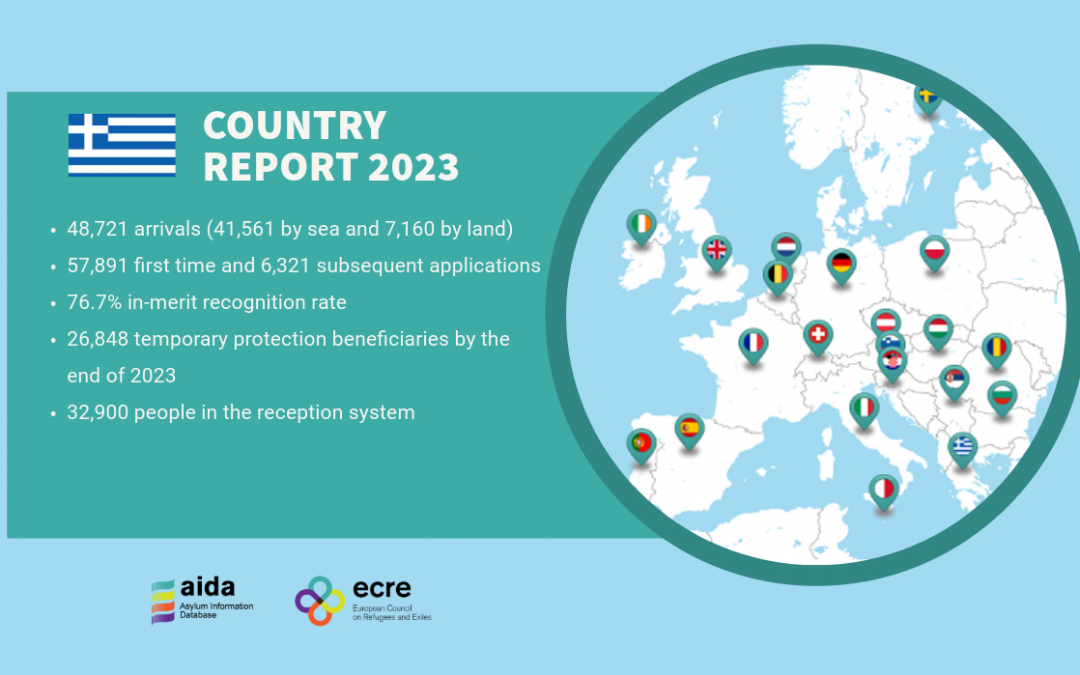The updated AIDA Country Report on Greece provides a detailed overview of legislative and practice-related developments in asylum procedures, reception conditions, detention of asylum seekers and content of international protection in 2023. It also includes an annex which provides an overview of temporary protection (TP).
In 2023, 41,561 refugees and migrants arrived in Greece by sea and 7,160 arrived by land (Total: 48,721). This represented a 159% increase compared to 2022 (18,780 arrivals). During the same period, the number of people reported dead or missing (799) more than doubled compared to 2022 (343). This increase was largely due to the devastating Pylos shipwreck that occurred on 14 June 2023. Of the people who arrived by sea, 24% were children (17% of whom were recorded as unaccompanied), 18% were women and 57% men. As in previous years, the majority were from Afghanistan and arrived in family groups. The registered number of entries in 2023 may, however, underrepresent the actual number of people who attempted to access the Greek territory, given the large number of alleged pushbacks, which continued to be reported as a systematic practice throughout the year.
The Asylum Service received 57,891 first-time asylum applications and 6,321 subsequent asylum applications in 2023 (compared to 29,097 first-time and 8,265 subsequent applications in 2022). The main countries of origin of applicants were Syria (21.8%), Afghanistan (14.8%), Palestine (10.5%), Iraq (10.1%) and Pakistan (6.3%). The recognition rate on the merits at first instance was 76.7% (compared to 62.3% in 2022), with 24,345 applicants receiving refugee status and 591 others receiving subsidiary protection. As of 31 December 2023, 26,848 people have been granted TP in Greece. In line with Article 3(5) of the TP Directive, Greece has applied more generous provisions vis-à-vis refugees from Ukraine, including applying it to people who fled the country after 26 November 2021 rather than 24 February 2022.
However, as in previous years, a significant number of applicants were not provided with access to an in merit examination. Instead, their applications were examined and rejected under the ‘safe third country’ concept, following the issuance of the Joint Ministerial Decision designating Türkiye as a safe third country for applicants from Afghanistan, Bangladesh, Pakistan Somalia and Syria. At the end of 2023, 32,730 applications (29,885 at first instance and 2,845 at second instance) were pending. This represented an almost 50% increase compared to 2022 (22,170 pending applications of which 17,249 at first instance and 4,921 at second instance). However, there was a decrease in the backlog of pending cases at second instance. As no readmission to Türkiye currently takes places, refugees whose applications are rejected as inadmissible based on the ‘safe third country’ concept end up in a state of legal limbo in the country and are exposed to a direct risk of destitution and detention. Following an application for annulment lodged by two NGOs in February 2023, the Council of State decided to refer a question to the Court of Justice of the EU (CJEU) for a preliminary ruling on the interpretation of Article 38 of Directive 2013/32/EU. The question was discussed at an oral hearing before the CJEU on 14 March 2024.
As of 31 December 2023, 32,900 people were inside the Greek reception system. Almost half of them (15,914) were residing on the islands. As in previous years, concerns continued to be raised about reception conditions in the newly established closed control access centres (CCACs) on the islands. Issues relating to the island CCACs’ ability to manage the number of people requiring accommodation were accentuated in 2023, particularly following an increase in the number of arrivals in the second half of the year. This was illustrated by the European Court of Human Rights’ decision to grant a number of interim measures throughout the year.
In 2023, 19,003 third country nationals, including 504 unaccompanied minors, were detained in pre-removal detention centres (PRDCs) (compared to 18,966 in 2022). By the end of the year, 2,325 third country nationals, including 1,003 asylum seekers, remained in administrative detention. In many cases, detention conditions in PRDCs, police stations and other facilities were judged to be substandard.
Beneficiaries of international protection (BIPs) who are residing in reception facilities must, with few exceptions, leave the accommodation provided to them within 30 days of being notified of their positive asylum decision. Given the limited integration of recognised BIPs in Greece, this has continued to result in a high risk of homelessness and destitution. Since 2021, several courts in other EU member states have largely halted the return of BIPs to Greece due to the risk of their being exposed to conditions of severe material deprivation amounting to violation of Article 4 of the EU Charter of Fundamental Rights. In early 2023, the European Commission launched infringement proceedings against Greece for its poor implementation of the Qualification Directive on the content of international protection, particularly beneficiaries’ access to social rights.
Accommodation was provided to TP beneficiaries both in reception centres and through the Hellenic Integration Support for Beneficiaries of International Protection (HELIOS) project. By November 2023, 14% of the 45,221 people who had been enrolled in the HELIOS project since its launch in 2019 were from Ukraine.
The full report is available here and the annex on temporary protection is available here.
The report was sent to the Ministry of Migration and Asylum in June 2024. The comments that the Ministry provided were taken into account by the authors and are available here.
For more information about the AIDA database or to read other AIDA reports, please visit the AIDA website.

